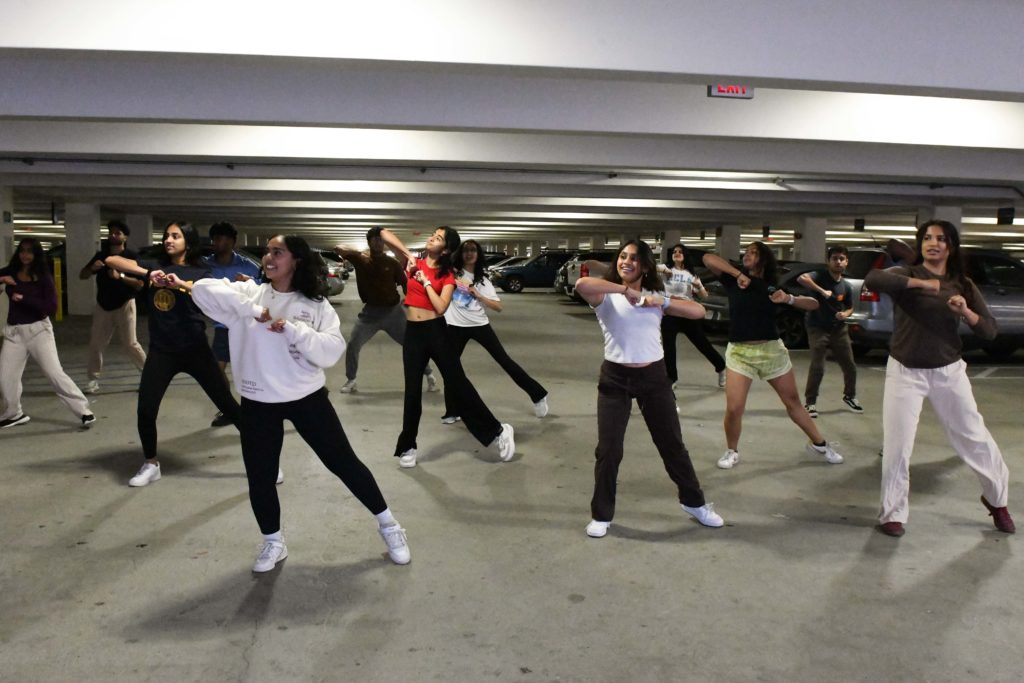ROOT[D’s annual Mock Mehndi event aims to showcase traditions, show cultural pride
Dressed in matching crewnecks, the members of ROOT[D pose together outside of Pauley Pavilion. The fusion dance team hosts an annual Mock Mehndi event each Spring. (Karla Cardenas-Felipe/Daily Bruin)
By Puja Anand
May 15, 2024 3:20 p.m.
This post was updated May 16 at 11:16 p.m.
ROOT[D is bringing the joy of South Asian weddings to UCLA.
The contemporary fusion dance team organizes an annual Mock Mehndi event mimicking a South Asian pre-wedding ceremony with this year marking the third, though the event has since been canceled. Through the event, the team hopes to bring visibility to South Asian culture and connect communities throughout UCLA, fourth-year biology student Praneetha Kakarla said. Third-year psychobiology student Maneesh Rajulapati said by highlighting traditions and bringing people together, the event aims to combat stigma.
“There’s a lot of stigma at times towards people who look like us or people who could come from Asia,” Rajulapati said. “This was a time for us to allow for people of all backgrounds to come together to celebrate South Asian culture and put a spotlight on it.”
Third-year human biology and society student Sanam Patel said weddings are a significant part of South Asian heritage, representing the vibrancy and extravagance of the culture. As a pre-wedding ceremony, the Mehndi event presents different traditions from the festivals celebrated on campus, Rajulapati said. Furthermore, he said organizing Mock Mehndi allows the organization to authentically embody the ceremony and demystify misunderstandings about South Asian culture on campus. The event encourages people from all backgrounds to partake in a South Asian wedding, thus learning more about the culture as a whole, Kakarla said.
The Mehndi typically begins with a “baraat,” a lively proceeding where family and friends dance around the to-be-wed couple as they meander to the venue, Patel said. A series of traditional functions and wedding games come after, which Patel said engages the audience by encouraging participation. Since South Asian culture encompasses a vast range of subcultures, the Mehndi has a plethora of events representing different parts of the Indian subcontinent, Kakarla said. As a team, ROOT[D values the diversity within the South Asian diaspora and hopes to exemplify those values in its event, third-year human biology and society student Aashna Bhandari said.
[Related: How dance team ROOT[D branches out while staying true to South Asian roots]
For instance, Kakarla said ROOT[D has incorporated more South Indian ceremonies, including one where the couple place leaves on each other’s heads as a blessing. Patel added that the organization has also integrated a Gujarati tradition involving the bride’s side stealing the groom’s slippers. Kakarla said she has been exposed to several previously unfamiliar customs and games from all across India through organizing Mock Mehndi.
“Something that’s been really fun for me is learning about the different games and things that people from other regions in India do at their weddings,” Kakarla said. “If it hadn’t been for planning Mock Mehndi, I don’t think I would have come across that any time here at UCLA.”
To further enrich the event, ROOT[D also requests guests share a tradition from their upbringing that they wish to see at the Mehndi, Bhandari said. By adding this personal layer to the event, the club hopes to place often overlooked traditions in the limelight, Bhandari said. Such touches of community input make the event stand out as a shared experience, she added.

By integrating the audience into the event’s proceedings, the team promotes a sense of inclusivity and diversity, Kakarla said. Moreover, to emphasize the significance of certain customs to those unfamiliar with them, Rajulapati said the event will have an emcee providing explanations as they occur. By welcoming people from all walks of life and immersing them in meaningful traditions, Bhandari said Mock Mehndi gives attendees an authentic glimpse into South Asian culture that is otherwise difficult to express. Rajulapati added that the wedding is an effective way to depict where he comes from and express pride in his heritage.
“This is a very easy way to visually demonstrate, ‘This is where I come from, this is what my heritage is,’” Rajulapati. “I feel a very strong sense of pride of being able to explore that and be able to do that alongside my friends too.”
[Related: Chinese Cultural Dance Club at UCLA uses performing arts to celebrate, educate]
As a team, ROOT[D aims to embrace new styles, aligning with their motto to be comfortable with being uncomfortable, Patel said. Since Mock Mehndi promotes exploring unheard traditions and learning new aspects of their own culture, Patel said it captures the team’s goals. ROOT[D heavily focuses on fusion dance, which Kakarla said is what Mock Mehndi is all about – sharing South Asian celebrations with people from all cultures.
Patel said that the team is a family and Mock Mehndi aims to cultivate the same sense of community. For Kakarla, ROOT[D has given her a space to rejoice in her culture, and she takes pride in sharing that with her peers. Rajulapati said for several students visiting home is a rarity, and thus Mock Mehndi provides people a way to combat their homesickness and reconnect with their culture.
“Throwing Mock Mehndi allows people to reignite and revisit some of their cultures and remember their home and so they don’t get too homesick,” Rajulapati said. “It’s helping people really remember why they love all of these things so much and remember why to be proud of where you came from.”
